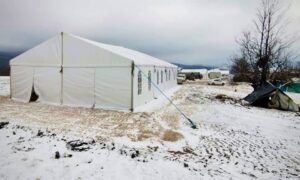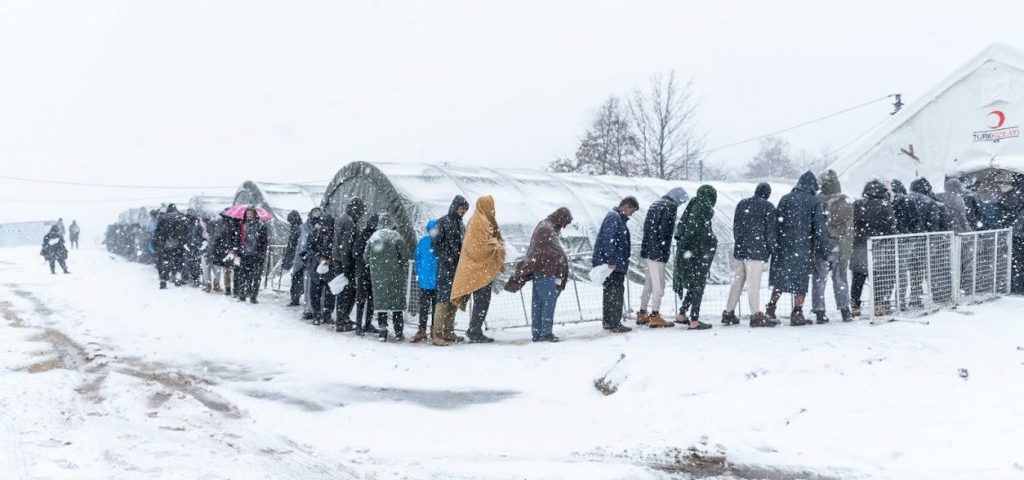- Mediterranean Hope - Federazione delle chiese evangeliche in Italia
- mh@fcei.it
Mediterranean Hope Reaches Bosnia
read in italian
Rome (NEV CS/04), 17thFebruary 2021 – A new “frontier” for the migrant and refugee programme of the Federation of Protestant Churches in Italy: Bosnia. Two MH team members, Claudia Vitali and Niccolò Parigini, arrived in the last few hours in Bihac, where they will work together over the next three months with IPSIA-ACLI thanks to an agreement between the Protestant churches and the organization which has operated along the Western Balkan route since 2015.
The FCEI mission, realised thanks to support from the Otto per Mille tax allocation of the Union of Methodist and Waldensian Churches, will see the establishment of new heated multipurpose tent hall which will functionas a social space. Communal kitchens will also be installed to enable migrants to prepare meals for themselves. It is also envisaged that the Bihač Red Cross will provide support, in particular, in relation to managing stock rooms and the distribution of goods and food.
“Our decision to commit ourselves, additionally, to a part of the Balkan Route to EU countries,” declares Paolo Naso, coordinator of Mediterranean Hope, refugee and migrantprogramme of the Federation of ProtestantChurches in Italy (FCEI) –has been prompted by a humanitarian crisis which is evident to everyone but which has met with indifference from the European institutions, which do not seem to appreciate quite how desperate conditions are for hundreds of people – amongst which many women and children – who are literally trapped in a country which does not welcome the mand in which they do not intend to stay. We are going to Bosnia in order to make practical contribution to the excellent work which IPSIA-ACLI has been carrying out for years together with the local Red Cross. But linked to this commitment is a specific political request for the newly-installed Italian administration and for European institutions: the dramatic situtaion of refugees Bosniar equires that an emergency humanitarian corridor be opened which guarantees protection and safety for the most vulnerable at the very least. Our five years of experience of managing humanitarian corridors demonstrates that an alternative to death journeys acrossse as and mountains exists. Therefore, with this new undertaking in Bosnia we are hoping to see how the worthy experience of humanitarian corridors from Lebanon might be applied for other refugees along other borders.”.

Credits: Matteo Placucci Photography and IPSIA BIH
“IPSIA is honored to have this collaboration with FCEI” –affrims Mauro Montalbetti, president of IPSIA-ACLI – “which will operate within the ambit of work we have been pursuing since the beginning of the Balkan migration crisis, when, in 2015, following the escalation of the conflict in Syriya, Kurdistan and Afghanistan, hundreds of thousands of people from these countries began to flood in, coming up to the Balkan peninsula from Greece in order to reach other Central European countries. After the closure of the European borders in March 2016, thousands of people found themselves stuck in Greece and Serbia and, successively, in Bosnia Herzegovina, where their presence in formal and informal camps is particularly concentrated in the north of the country, on the border with Croatia, where an estimated3500 people are present. In close cooperation with the local Red Cross, we have activated emergency programmes targeting these people, families in transit or stopping, for whom we are trying to provide some refreshment and a place for self-respect, social relations and humanity. Thanks to this project, ww shall be able to implement something which goes beyond first reception and help. Given the pandemic which is underway, this project providing equipment and resources as an expression of international solidarity, should not be taken lightly. But this is our duty and we shall continue to do it”.
For further information on the IPSIA-ACLI project: https://sostieni.ipsia-acli.it/crowd/balkan-route/




